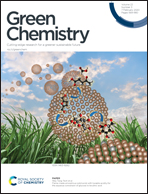Fully bio-derived CO2 polymers for non-isocyanate based polyurethane synthesis†
Abstract
The synthesis of partly carbonated polybutadienes (PC-PBDs) was developed starting from partly epoxidized polybutadienes (PE-PBDs) and CO2 as renewable feedstock. The latter is a versatile polymer precursor for post-functionalization. A screening of metal-free catalysts demonstrated superior performance of bis(triphenylphosphine)iminium chloride (PPN-Cl) relative to tetra-n-butylammonium bromide (TBAB), giving >99% epoxide conversion and >99% chemoselectivity. Initial higher activities were found for PPN-Br. PPN-X (X = Cl, Br, I) catalyst activities increase in the order Br > Cl > I. Investigation of the polymer microstructures under different reaction conditions revealed that 1,2-vinyl and 1,2-cyclic epoxides are the most reactive moieties towards CO2 followed by cis- and trans epoxides, respectively. Subsequently performed non-isocyanate polyurethane (NIPU) cross-linking reactions using (bio-derived) diamines demonstrated the capability of these PC-PBDs as a modular feedstock for the synthesis of tunable hybrid NIPU thermosets.



 Please wait while we load your content...
Please wait while we load your content...